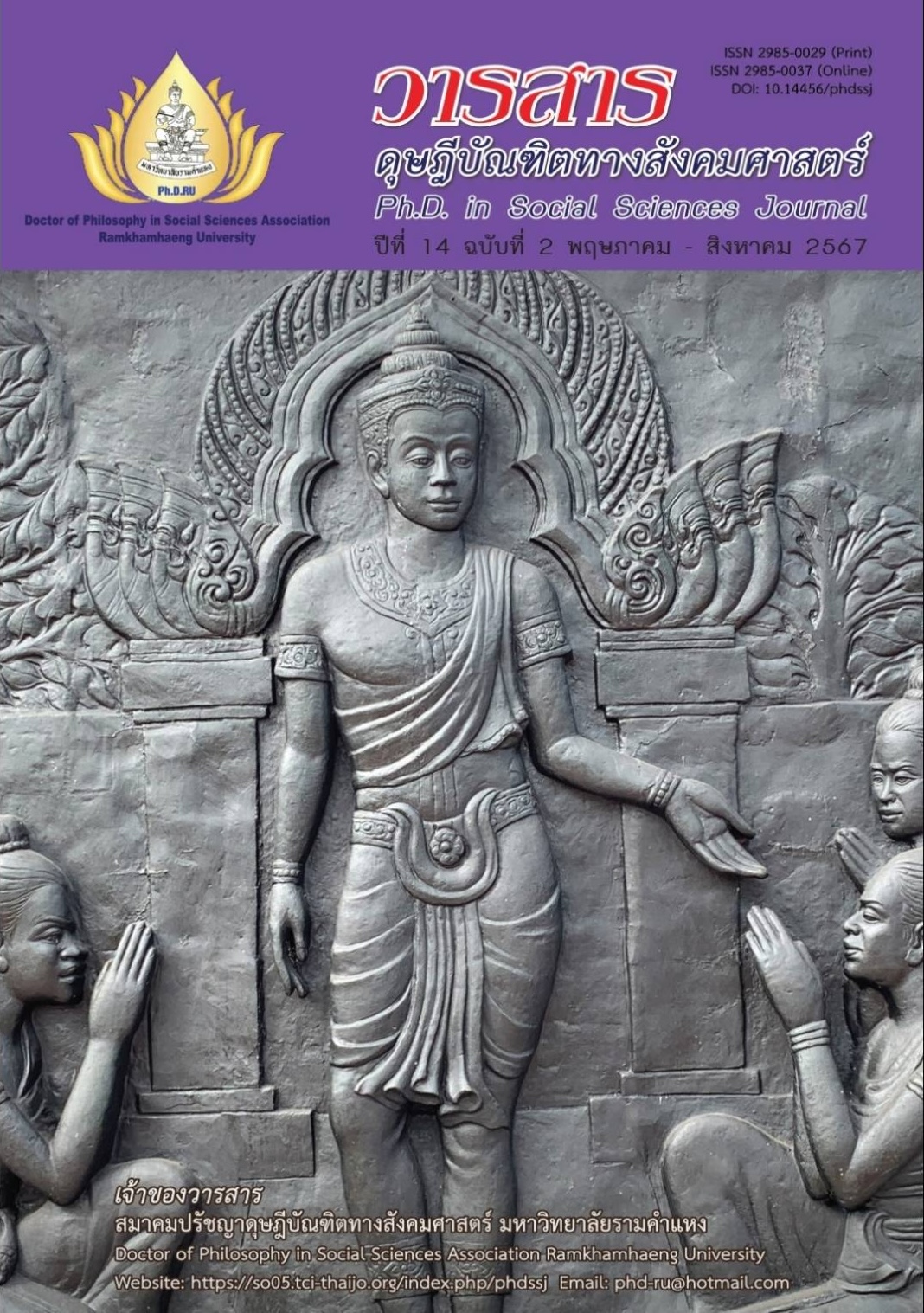ผลกระทบของการปรับประยุกต์ใช้เทคโนโลยีดิจิทัลและบุพปัจจัยต่อการรับรู้ผลการดำเนินงานขององค์การในอุตสาหกรรมชิ้นส่วนยานยนต์ไทย
Main Article Content
บทคัดย่อ
บทความวิจัยนี้มีวัตถุประสงค์เพื่อ (1) ศึกษาผลกระทบของการปรับประยุกต์ใช้เทคโนโลยีดิจิทัลที่มีผลต่อการรับรู้ผลการดำเนินงานขององค์การอุตสาหกรรมชิ้นส่วนยานยนต์ไทย และ (2) ศึกษาผลกระทบของการปรับประยุกต์ใช้เทคโนโลยีดิจิทัลขององค์การอุตสาหกรรมชิ้นส่วนยานยนต์ไทย ระเบียบวิธีวิจัยเป็นการวิจัยแบบผสม โดยใช้วิจัยเชิงคุณภาพโดยการสัมภาษเชิงลึกผู้ให้ข้อมูลหลัก จำนวน 7 คน การวิจัยเชิงปริมาณใช้แบบสอบถามเป็นเครื่องมือในการเก็บข้อมูลจากบุคลากรที่อยู่ในอุตสาหกรรมชิ้นส่วนยานยนต์ จำนวน 472 ตัวอย่าง สถิติที่ใช้ คือ สถิติเชิงพรรณนาและการวิเคราะห์ตัวแบบสมการโครงสร้าง
ผลการวิจัย พบว่า ผลกระทบทางการประยุกต์ใช้เทคโนโลยีดิจิทัลบวกต่อองค์การแห่งการเรียนรู้ ทีมที่ทรงพลัง การปรับประยุกต์ใช้เทคโนโลยีดิจิทัลและการรับรู้ผลการดำเนินงานองค์การอุตสาหกรรมชิ้นส่วนยานยนต์ไทย ข้อค้นพบ/คุณค่าที่ได้จากงานวิจัยนี้การเป็นองค์การแห่งการเรียนรู้ สามารถสร้างทีมที่มีศักยภาพแข็งแกร่งสู่ความสามารถการปรับประยุกต์ใช้เทคโนโลยีดิจิทัลและผลการดำเนินงานที่ได้ตามเป้าหมาย ซึ่งข้อค้นพบ/คุณค่าที่ได้ถือเป็นประโยชน์ต่อผู้ที่จะศึกษาเรื่องของการปรับประยุกต์ใช้เทคโนโลยีดิจิทัลและการรับรู้ผลการดำเนินงานองค์การในอุตสาหกรรมชิ้นส่วนยานยนต์และกลุ่มอุตสาหกรรมอื่นต่อไปในอนาคต
Article Details

อนุญาตภายใต้เงื่อนไข Creative Commons Attribution-NonCommercial-NoDerivatives 4.0 International License.
บทความวิชาการ บทความวิจัย และบทวิจารณ์หนังสือในวารสารดุษฎีบัณฑิตทางสังคมศาสตร์ เป็นความคิดเห็นของผู้เขียน มิใช่ของคณะผู้จัดทำ และมิใช่ความรับผิดชอบของสมาคมปรัชญาดุษฎีบัณฑิตทางสังคมศาสตร์ มหาวิทยาลัยรามคำแหง (กรณีการทำวิจัยในมนุษย์ ผู้วิจัยต้องผ่านการอบรมจริยธรรมการวิจัยในมนุษย์ และนำหลักฐานมาแสดง)
เอกสารอ้างอิง
Angsuchoti, S., Wijitwanna, S., & Pinyopanuwat, R. (2014). Analysis statistics for social and behavior science: Technique for LISREL program (4th ed.). Charoendeemonkong Printing. [In Thai]
Comrey, A. L., & Lee, H. B. (1992). A first course in factor analysis (2nd ed.). Psychology Press.
Daft, R. L. (2002). The leadership experience (2nd ed). Harcourt College.
Dekoulou, P., & Trivellas, P. (2014). Learning organization in Greek advertising and media industry: A way to face crisis and gain sustainable competitive advantage. Procedia–Social and Behavioral Sciences, 148, 338-347.
Ebert, R. J., & Griffin, R. W. (2015). Business essential (10th ed.). Pearson.
Fornell, C., & Larcker, D. F. (1981). Evaluating structural equation models with unobservable variables and measurement error. Journal of Marketing Research, 18(1), 39-50.
Greene, J. C., Caracelli, V. J., & Graham, W. F. (1989). Toward a conceptual framework for mixed-method evaluation designs. Educational Evaluation and Policy Analysis, 11(3), 255-274.
Huber, G. P. (1991). Organizational learning: The contributing process and the literatures. Organization Science, 2(1), 88-115.
Jenatabadi, H. S. (2015). An overview of organizational performance index: Definitions and measurements. Retrievred from https://ssrn.com/abstract=2599439
Kiewcharoen, M., Meechaisue, P., Sanguanwongwan, W., & Chinuntdej, N. (2021). The impact of effective teams and their antecedents on perceived organizational performance in the Thai auto parts industry. Ph.D. in Social Sciences Journal, 11(2), 508-519. [In Thai]
KKP Advice Center. (2022). KKP research: When the automotive industry shifts to EV, why is Thailand at a disadvantage to competitor. Retrievred from https://media.kkpfg.com/document/2022/Apr/KKP%20Research_Thai_Automotive_Industry_Analysis_Edit.pdf [In Thai]
M Repot. (2023). How Japanese machine tools are catching the green transformation trend?. Retriverd form https://www.mreport.co.th/news/trend-and-innovation/203-Japanese-Machine-Tools-caught-Green-Transformation-trend [In Thai]
Ministry of Industry. (2016). Thai industrial development strategy 4.0, 20-year period (2017-2036). Author. [In Thai]
Owen, H. (1990). Spirit: Transformation and development in organizations. Abbott.
Parker, G. M. (1996). Team players and teamwork: The new competitive business strategy. Jossey-Bass.
Ramaswamy, V., & Ozcan, K. (2018). What is co-creation?: An interactional creation framework and its implications for value creation. Journal of Business Research, 84, 196-205.
Reis, J., Amorim, M., Melão, N., & Matos, P. (2018). Digital transformation: A literature review and guidelines for future research. In A. Rocha., H. Adeli., L. P. Reis., & S. Costanzo (Eds.), Trends and advances in information systems and technologies (pp. 411-421). Springer.
Senge, P. M. (1990). The fifth discipline: The art and practice of learning organization. Doubleday/Currency.
Stata, R. (1989). Organizational learning-the key to management innovation. Sloan Management Review, 30(3), 63-74.
Thai PBS. (2023). Japanese technology electric vehicles made in Thailand: See and know Dohiru [CC]. Retrievred from https://www.youtube.com/watch?v=7yf0KpxyrBY [In Thai]
Thailand Automotive Institute, Automative Intelligence Unit. (2022). Entrepreneur database. Retrievred from https://data.thaiauto.or.th
Yulk, G. (2002). Leadership in organizations (5th ed.). Prentice Hall.
Zoltan, R., & Vancea, R. (2015). Organizational work groups and work teams-approaches and differences. Ecoforum Journal, 4(1), 94-98.


